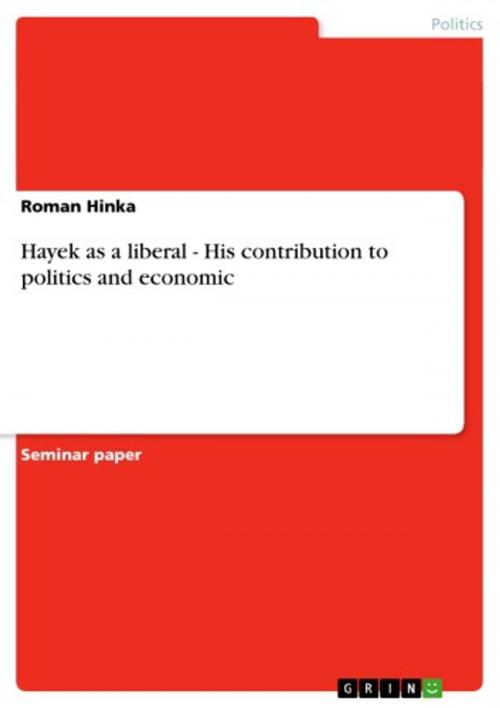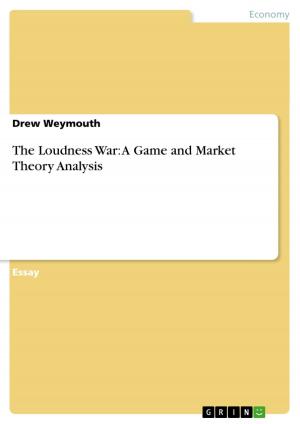Hayek as a liberal - His contribution to politics and economic
His contribution to politics and economic
Nonfiction, Social & Cultural Studies, Political Science, International, International Relations| Author: | Roman Hinka | ISBN: | 9783638372800 |
| Publisher: | GRIN Publishing | Publication: | April 30, 2005 |
| Imprint: | GRIN Publishing | Language: | English |
| Author: | Roman Hinka |
| ISBN: | 9783638372800 |
| Publisher: | GRIN Publishing |
| Publication: | April 30, 2005 |
| Imprint: | GRIN Publishing |
| Language: | English |
Seminar paper from the year 2005 in the subject Politics - International Politics - General and Theories, grade: 1,0, European University Viadrina Frankfurt (Oder), course: Political and Economical Liberalism, 20 entries in the bibliography, language: English, abstract: The present paper deals with Friedrich August von Hayek, one of the prominent liberal thinkers of the twentieth century. He engaged himself actively in economy, political philosophy, psychology, and epistemology. The Royal Swedish Academy of Sciences awarded Professor Hayek the Prize in Economic Science in Memory of Alfred Nobel for 1974 together with Professor Gunnar Myrdal ?for their pioneering work in the theory of money and economic fluctuations and for their penetrating analysis of the interdependence of economic, social and institutional phenomena?1. But his contribution does not limit only to economic. Hayek developed his seminal explanation of business cycle based on classical macroeconomic theories of Knuth Wicksell and Ludwig von Mises. Theirs ideas are briefly presented in the first part of Chapter I. Further it will be discussed the essence of the theory of business cycle in terms of production structure and capital employment. In particular, the model demonstrates that boom-bust cycles are caused not by mysterious defects inherent in industrial capitalism, but by the unfortunate inflationary bank credit expansion propelled by central banks. Next section presents Hayek?s ideas about the role of money in economy and intelligent monetary policy. The problem of price system in market economy, linking Hayeks economic and political articles and books is elaborated in section four of Chapter I. Critical remarks to his statements voiced by his adversaries and fellows are discussed directly in the main text. The rationale for such structure is to alleviate understanding of the subject. In the next chapter one gets on overview of The Road to Serfdom, the book by which Professor Hayek deserved popularity from both sides of Atlantic. It linked the statism of communism, social democracy, and fascism, and demonstrated that, just as people who are best suited for any given occupations will rise to the top in those pursuits, so under statism, 'the worst' would inevitably rise to the top. The attention is paid to the critical issues like alleged advantages of central planning and market economy, the idea of a unity of liberal tradition, and Hayek?s view of post-war international order. The chapter includes statements from his debates with socialists. The paper refers heavily to Hayek?s works like Monetary Theory and Trade Cycle (1929), Prices and Production (1931), The Use of Knowledge in Society (1945), The Road to Serfdom (1944).
Seminar paper from the year 2005 in the subject Politics - International Politics - General and Theories, grade: 1,0, European University Viadrina Frankfurt (Oder), course: Political and Economical Liberalism, 20 entries in the bibliography, language: English, abstract: The present paper deals with Friedrich August von Hayek, one of the prominent liberal thinkers of the twentieth century. He engaged himself actively in economy, political philosophy, psychology, and epistemology. The Royal Swedish Academy of Sciences awarded Professor Hayek the Prize in Economic Science in Memory of Alfred Nobel for 1974 together with Professor Gunnar Myrdal ?for their pioneering work in the theory of money and economic fluctuations and for their penetrating analysis of the interdependence of economic, social and institutional phenomena?1. But his contribution does not limit only to economic. Hayek developed his seminal explanation of business cycle based on classical macroeconomic theories of Knuth Wicksell and Ludwig von Mises. Theirs ideas are briefly presented in the first part of Chapter I. Further it will be discussed the essence of the theory of business cycle in terms of production structure and capital employment. In particular, the model demonstrates that boom-bust cycles are caused not by mysterious defects inherent in industrial capitalism, but by the unfortunate inflationary bank credit expansion propelled by central banks. Next section presents Hayek?s ideas about the role of money in economy and intelligent monetary policy. The problem of price system in market economy, linking Hayeks economic and political articles and books is elaborated in section four of Chapter I. Critical remarks to his statements voiced by his adversaries and fellows are discussed directly in the main text. The rationale for such structure is to alleviate understanding of the subject. In the next chapter one gets on overview of The Road to Serfdom, the book by which Professor Hayek deserved popularity from both sides of Atlantic. It linked the statism of communism, social democracy, and fascism, and demonstrated that, just as people who are best suited for any given occupations will rise to the top in those pursuits, so under statism, 'the worst' would inevitably rise to the top. The attention is paid to the critical issues like alleged advantages of central planning and market economy, the idea of a unity of liberal tradition, and Hayek?s view of post-war international order. The chapter includes statements from his debates with socialists. The paper refers heavily to Hayek?s works like Monetary Theory and Trade Cycle (1929), Prices and Production (1931), The Use of Knowledge in Society (1945), The Road to Serfdom (1944).















